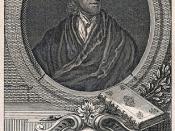Hume's and Locke's Skeptical Empiricism � PAGE �1�
Running Head: Hume's and Locke's Skeptical Empiricism
Hume's and Locke's Skeptical Empiricism
[The Writer's Name]
[The Name of the Institution]�
Hume's and Locke's Skeptical Empiricism
The doctrine of innate ideas is most significant in the development of empiricism since it points in the direction of the analysis of human understanding, the enterprise which engaged Locke and Hume. That Locke opens his Essay Concerning Human Understanding with a polemic against innate ideas is adequate testimony to this point. Locke considers ideas only from the point of view of their fixed character and regards capacities or faculties of the mind as merely expressing the fact that the mind can have ideas. The nature of such a faculty, its extent and limitations, considered in itself before a given idea or principle is present to the mind would be relevant to a discussion of the causes of the idea or principle.
The faculty must at least be part of the causal process, but Locke does not allow even this modest point because he is committed to the position that the only cause of ideas of sense is external. The mind is supposed to be as passive as a white piece of paper. Locke's peculiar doctrine that external objects in the natural world have powers which produce the various ideas of sense in our minds is a consequence of his refusal to allow that the mind may have an active part in the causation of ideas of sense. Since all innate ideas are disallowed and there is no point in discussing capacities or faculties of the mind as such, he is then free to attribute the entire cause to external bodies.
The reason Locke cannot allow any kind of a priori structure or disposition to the mind,


